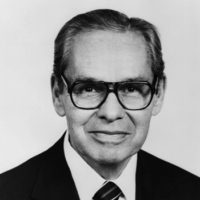
Saul Krugman
New York University
For leadership in conceiving, developing, and testing vaccines against various viral diseases, especially hepatitis B, with vast impact on world health.
In the early 1950s, Dr. Krugman and his associates set out to combat infectious diseases in children. In 1960, he showed that children could be protected against measles by using live attenuated virus vaccine. In 1969, he confirmed the effectiveness of the first vaccine against rubella.
Rubella, which formerly caused brain damage and severe physical disabilities among tens of thousands of babies born to women who contracted the disease while pregnant, is now virtually unknown in the US Today, measles is a medical rarity in the US, where 95 percent of our children are vaccinated against it.
Dr. Krugman’s most far-reaching achievement concerns viral hepatitis. In a long and elegant sequence of studies beginning in the mid-1950s, he proved that “infectious” (type A) hepatitis, transmitted by the fecal-oral route, and the more serious “serum” (type B) hepatitis, transmitted by blood, body secretions, and sexual contact, were caused by two immunologically distinct viruses.
Dr. Krugman also discovered that heat-treated serum from a chronic carrier of hepatitis B could elicit protective antibodies in a susceptible person without causing the disease. This brilliantly simple discovery paved the way for the development of various hepatitis B vaccines now licensed for worldwide use. Over 300 million people throughout the world are chronic carriers of hepatitis B and, as a consequence, can themselves develop cancer of the liver and other dangerous illnesses.
To Dr. Krugman, for his courageous leadership in conceiving, developing, and testing vaccines against various viral diseases, especially hepatitis B, with vast impact on world health, this 1983 Albert Lasker Public Service Award is given.
